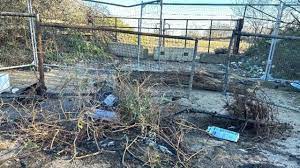The largest illegal tips required £13.2 million to clear, but only £785,000 in court fines were collected—a 17% decrease.
The numbers, which are limited to public land, were unveiled on Wednesday and do not include a valuation of all fly-tipping expenses.
However, private landowners claim they are being forced to convert their farms into “medieval forts” due to the extent of fly-tipping in the countryside.
Fly-tipping is “going unrecorded on a mass scale” on private land and fields, according to the Country Land and Business Association (CLA), and waste criminals are being deterred by security fencing and concrete blocks.
Colin Rayner, a farmer with 2,000 acres of arable land spanning south Buckinghamshire and east Berkshire, claimed that waste is dumped on his property nearly every weekend.
We even had an incident where a truck pulled into a field where we were combining, opened its tailgate, tipped out a load of trash, and then drove away. He said, “They really are that brash.
The entire yearly clean-up costs, Mr. Rayner continued, were “unimaginable – it affects the viability of the business”.
These days, he uses security fencing and five-ton concrete blocks to block field entrances and prevent bigger tipper truck lorries from dumping waste on his property. However, he claimed that loads continued to be thrown over the fences and dropped in the entrance ways.
Even during the pandemic’s peak fly-tipping, security guards were on duty.
“Any farm in this area is doing the same thing, even though it shouldn’t be this way. Their fields were previously ungated, but they are now beginning to do so,” he continued.
According to a recent survey conducted by the Country Land and Business Association (CLA), fly-tipping of tons of commercial and domestic waste was estimated to have an impact on two-thirds of farmers and landowners.
Hazardous chemicals and asbestos are frequently discarded, posing a threat to the environment, farm laborers, walkers, wildlife, and livestock.
The CLA’s president, Victoria Vyvyan, stated: “These fly-tipping figures barely scratch the surface of a crime that’s blighting rural communities, with incidents on private land going unrecorded on a mass scale.”







